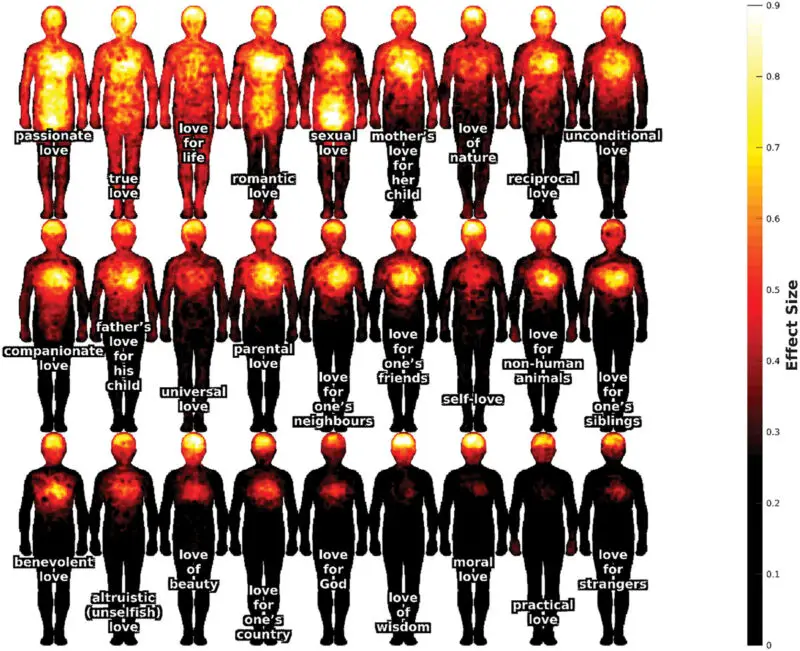By Lily Anderson
Staff Writer for Wake Up World
Love, in all its diverse forms, is a profoundly human experience that has long captivated philosophers, poets, and scientists alike. It is a complex emotion that transcends cultural, geographical, and temporal boundaries, shaping our lives in ways both subtle and profound. As we navigate the intricate tapestry of human emotions, love stands as a beacon, illuminating our path with its many facets.
[pro_ad_display_adzone id=”110028″]
Now, at Aalto University, researchers have embarked on a fascinating journey, seeking to unravel the enigma of love’s physical and emotional dimensions. This ambitious study aims to not only pinpoint where love resides within our bodies but also shed light on the varying degrees of intensity with which we experience this fundamental human emotion. In the process, it offers a unique perspective on the deep and intricate connection between love and our corporeal selves.
Love’s Many Facets: From Romantic to Divine
The study, led by philosopher Pärttyli Rinne, sought to explore the intricate web of love by dissecting it into 27 distinct types. These included romantic love, sexual love, parental love, love for friends, strangers, nature, God, and even self-love. Researchers then asked participants to describe where in their bodies they felt these various forms of love and to gauge the intensity of both physical and mental sensations.
Pärttyli Rinne explains,
It was noteworthy, though not very surprising, that the types of love associated with close relationships are similar and are the most strongly experienced.
But what exactly did this study uncover about the geography of love within our bodies, and what implications might it hold for our understanding of love and human relationships?
Love’s Journey Through the Body
As the data poured in, an intriguing map of love’s journey through the human body began to take shape. While all types of love were felt profoundly in the head, their paths diverged as they ventured further. Some love types remained confined to the chest, while others extended their embrace throughout the entire body. Notably, the strongest forms of love were those that permeated most extensively.
For instance, the affection you feel for your partner may manifest as a warm sensation in your chest and a flutter in your stomach, while the love for a friend might be primarily felt in your head as a sense of familiarity and comfort.
This exploration was no small endeavor. The researchers collected data from hundreds of participants through an online survey, with a significant portion of responses coming from young women in higher education. They asked participants to mark areas on a body silhouette where they felt each type of love and to provide insights into the intensity, pleasantness, and connection to touch associated with these emotions.
Love’s Intensity and Pleasantness
A compelling revelation emerged from the study: a strong correlation exists between the physical and mental intensity of a particular type of love and its pleasantness. Simply put, the more profoundly you feel love within your body, the more it resonates in your mind, creating a heightened sense of pleasure. This suggests that love is not just an abstract concept but a deeply embodied experience.
Pärttyli Rinne adds,
Love between persons is divided into sexual and non-sexual. The types of love that are particularly close to each other are those that have a sexual or romantic dimension.
Understanding how love is experienced in the body can have profound implications for how we approach our relationships and well-being. When we recognize the physicality of love, we may become more attuned to our emotions and better equipped to navigate the complexities of human connections.
Cultural Nuances and the Experience of Love
Pärttyli Rinne also notes the influence of culture and demographics on the experience of love. “If the same study were done in a highly religious community,” he speculates, “love for God might be the most strongly experienced love of all.” Similarly, different life contexts can alter the dynamics of love, such as the strong bond between parents and children.
For instance, a parent’s love for their child may be experienced as a profound sensation throughout the body, from the warmth of their heart to the tingling in their fingertips. This deep connection is not only biological but also profoundly emotional and cultural.
The Uncharted Territory of Love
The study offers a captivating glimpse into the intricate interplay between love and our physical and emotional selves. While it raises intriguing questions about the nature of love, it also underscores the universal and deeply human experience of this profound emotion.
[pro_ad_display_adzone id=”110030″]
As the research unfolds, we may continue to unlock the mysteries of love, revealing more about how it shapes our lives, our relationships, and our very being. Love, it seems, is not just a matter of the heart but a complex dance of sensations that traverses our bodies and minds, enriching our human experience in ways we are only beginning to fathom.
So, the next time you feel love’s embrace, take a moment to reflect on where you feel it in your body. This intimate connection between love and the self may hold the key to deeper self-awareness and a richer understanding of the bonds that tie us together in this shared human experience.
Reference:
- Pärttyli Rinne, Mikke Tavast, Enrico Glerean, Mikko Sams. Body maps of loves. Philosophical Psychology, 2023; 1 DOI: 10.1080/09515089.2023.2252464
About the author:
Lily Anderson is a passionate wordsmith and dedicated explorer of cutting-edge scientific inquiries. Fuelled by a thirst for knowledge, she skilfully transforms intricate ideas into relatable tales, inviting readers to embark on a captivating expedition of revelation. Lily’s efforts play a crucial role in bridging the gap between experts and the wider public, evoking a sense of awe and encouraging insightful discussions about groundbreaking scientific advancements.
[pro_ad_display_adzone id=”110027″]








